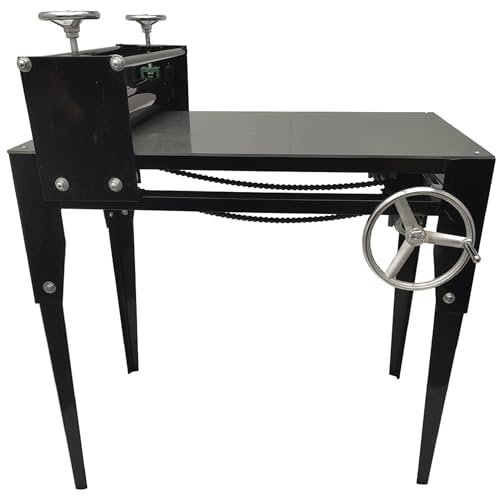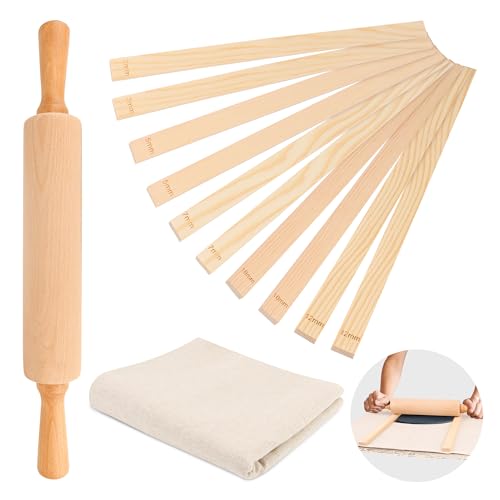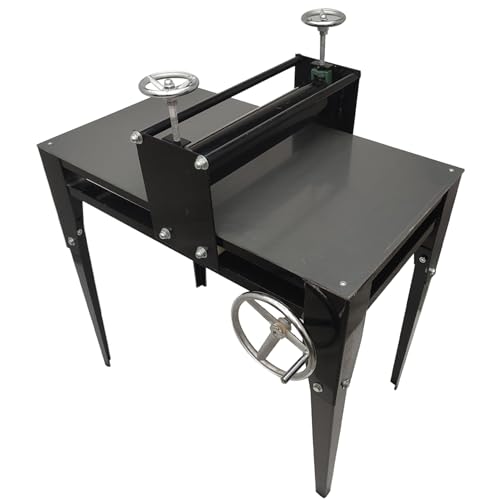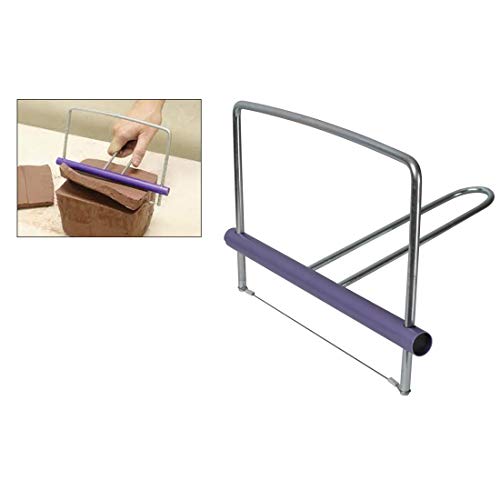If you’re serious about pottery, finding the right slab roller can elevate your craft. Whether you’re just starting or have years of experience, the right tool makes all the difference in creating consistent, high-quality pieces. From portable hand-cranked models to powerful electric options, there’s a variety to explore. Let’s take a closer look at the best slab rollers available and what makes each one unique for your creative journey.
Hand Cranked Ceramic Slab Machine for Clay Pottery
If you’re a pottery enthusiast looking to elevate your craft, the Hand Cranked Ceramic Slab Machine is the perfect choice for you. This manual slab roller combines quality and durability, ensuring it stands the test of time. With its efficient design, you’ll create smooth, even slabs every time, perfect for various projects. The user-friendly features, including a folding mechanism and precise scales, make it suitable for all skill levels. Whether you’re crafting plates, tiles, or other pottery, this versatile machine enhances your creative process, allowing you to focus on what you love most—bringing your clay ideas to life!
Best For: Pottery enthusiasts of all skill levels seeking a reliable and efficient slab roller for creating high-quality clay pottery.
Pros:
- Durable construction ensures longevity and reliability for consistent use.
- User-friendly design with precise scales enhances the clay sculpting experience.
- Versatile for various types of clay and perfect for crafting plates, tiles, and other pottery.
Cons:
- Manual operation may require more effort compared to electric alternatives.
- Limited to a specific size of slabs depending on the machine’s dimensions.
- May not be suitable for large-scale production due to its hand-cranked nature.
Sasylvia 10 Pcs Pottery Teaching Rolling Pin Guide Set
The Sasylvia 10 Pcs Pottery Teaching Rolling Pin Guide Set is an excellent choice for both beginners and experienced pottery enthusiasts. With five thickness options and ten pieces in total, you’ll find the perfect size for your projects. The sturdy wooden construction guarantees a comfortable grip, while the engraved markings make it easy to achieve consistent results. Weighing just 0.28 kg, it’s lightweight and portable, ideal for crafting on the go. Customers love its ease of use and smooth finish, making it a fantastic addition to your pottery toolkit. Plus, it comes with a handy storage box for organization.
Best For: The Sasylvia 10 Pcs Pottery Teaching Rolling Pin Guide Set is best for pottery beginners and enthusiasts looking for a versatile and user-friendly tool for their crafting projects.
Pros:
- Sturdy wooden construction provides a reliable grip and durability.
- Engraved thickness markings allow for easy identification and consistent results.
- Lightweight and portable, making it perfect for crafting on the go.
Cons:
- Some users reported issues with splintered pieces, affecting usability.
- Suggestions for improving the grip have been noted by a few customers.
- The limited color options may not appeal to everyone’s aesthetic preferences.
DIYOOHOMY 10 Pcs Rolling Pin Guides for Dough Thickness
For potters seeking precision in their craft, the DIYOOHOMY 10 Pcs Rolling Pin Guides are an essential tool. This set includes ten high-quality pine wood guides in sizes ranging from 3mm to 12mm, allowing you to achieve uniform thickness in your clay. Simply place the desired guide on either side of your material and roll your pin over them. These durable guides guarantee stability for repeated use, enhancing your pottery’s overall consistency. Suitable for both beginners and experienced potters, the DIYOOHOMY guides help you experiment with various textures and shapes, saving time and delivering professional results every time.
Best For: Potters and clay enthusiasts seeking precision and consistency in their craft.
Pros:
- Durable pine wood construction ensures stability and longevity for repeated use.
- Variety of thickness guides (3mm to 12mm) allows for experimentation with different textures and shapes.
- Suitable for both beginners and experienced potters, enhancing precision and saving time.
Cons:
- Limited to rolling pin use, may not suit all pottery techniques.
- Requires proper care (keeping dry) to prolong service life.
- May not be compatible with very soft or sticky clay without additional adjustments.
HQHAOTWU Ceramic Clay Plate Machine for Pottery Making
Crafted with beginners in mind, the HQHAOTWU Ceramic Clay Plate Machine makes pottery making accessible and enjoyable. Weighing 107 pounds, its sturdy iron frame guarantees durability, while the manual operation saves energy. With dimensions of 17.5 inches and a clay thickness of up to 1.77 inches, you can achieve consistent results easily. The detachable frame enhances portability, making it perfect for art schools or home use. Adjust the thickness up to 4.5 cm with the dual wheel control for customized projects. This user-friendly machine is ideal for anyone enthusiastic to explore their pottery-making skills.
Best For: Beginners looking to explore pottery making in schools or at home.
Pros:
- User-friendly design with adjustable thickness for customized results.
- Durable iron frame ensures long-lasting performance.
- Manual operation promotes energy efficiency and portability.
Cons:
- Weighs 107 pounds, which may be cumbersome for some users to move.
- Limited to manual operation, which might not suit those seeking electric machines.
- Best suited for basic pottery projects, may not meet advanced needs of experienced potters.
12 Pcs Pottery Tools Teaching Set with Slab Roller and Rolling Pin Guides
Whether you’re a beginner enthusiastic to learn pottery or a seasoned artist refining your skills, the 12 Pcs Pottery Tools Teaching Set with Slab Roller and Rolling Pin Guides is an excellent choice. This set includes a 17-inch slab roller and 10 wooden rolling pin guides in five thickness sizes, allowing you to achieve your desired clay consistency effortlessly. Made from durable wood, these tools are built to last, while the breathable linen tablecloth keeps your clay moisture-proof. Perfect for classrooms, studios, or DIY projects, this set meets all your pottery needs, ensuring a smooth and enjoyable crafting experience.
Best For: Pottery enthusiasts, from beginners to professionals, looking for a comprehensive set of tools to enhance their clay crafting experience.
Pros:
- Durable Materials: Tools are made from sturdy wood and a breathable linen tablecloth, ensuring long-lasting use.
- Versatile Thickness Options: Offers five different thickness sizes for rolling pin guides, allowing for precise clay consistency.
- User-Friendly Setup: Easy to use with clear instructions, making it suitable for classrooms and DIY projects.
Cons:
- Limited Quantity: The set contains only 12 pieces, which may not be sufficient for larger group projects.
- Wood Material Care: Wooden tools may require regular maintenance to prevent wear and tear.
- Learning Curve: Beginners may need time to practice using the tools effectively for optimal results.
TECHTONGDA Pottery Clay Machine
The TECHTONGDA Pottery Clay Machine stands out as an excellent choice for ceramic craft operators seeking a reliable manual slab roller. With a panel size of 33.8 x 20 inches and a roller size of 17.5 x 3.1 inches, it provides ample space for your projects. You can easily adjust thickness using the two knobs, ensuring uniformity in your clay. The sturdy iron frame resists rust, and its self-lubricating gears enhance durability. Plus, it’s easy to set up and dismantle, making it perfect for desktop use. Just remember to use a felt blanket when pressing your clay!
Best For: Ceramic craft operators looking for a reliable manual slab roller for pottery making.
Pros:
- Durable construction with a rust-resistant iron frame.
- Adjustable thickness settings for consistent clay uniformity.
- Easy to set up and dismantle, suitable for desktop use.
Cons:
- Manual operation may require more physical effort compared to electric models.
- Limited to a maximum thickness of 1.77 inches, which may not suit all projects.
- Requires additional felt blanket for optimal pressing, adding to setup needs.
Creative Hobbies Hardwood Pony Roller for Ceramic and Crafting
For artists and crafters seeking versatility in their projects, the Creative Hobbies Hardwood Pony Roller stands out as an essential tool. This 2-in-1 design features a larger roller for smoothing and compressing clay and a smaller one for intricate details. Measuring 9.2 x 6.1 x 1 inches and weighing just 4.8 ounces, it’s easy to handle. Made from high-quality hardwood, it offers durability and comfort. Whether you’re working with clay, rhinestones, or other craft projects, this roller enhances your creative experience. With a stellar 4.7-star rating, it’s a fantastic gift for any pottery enthusiast looking to explore new possibilities.
Best For: Artists, crafters, and pottery enthusiasts seeking a versatile tool for enhancing their creative projects.
Pros:
- Durable construction with high-quality hardwood ensures longevity.
- Versatile 2-in-1 design accommodates various crafting mediums, including clay and rhinestones.
- Lightweight and easy to handle, making it suitable for both beginners and experienced users.
Cons:
- Limited to smaller projects, may not be suitable for larger crafting tasks.
- Requires careful handling to maintain the integrity of the hardwood material.
- Not suitable for heavy-duty applications, as it is primarily designed for detailed work.
AMACO 1473770 Adjustable Handled Clay Slicer, Stainless Steel
Crafted with an adjustable handle guide bar, the AMACO 1473770 Adjustable Handled Clay Slicer is perfect for artists and potters who demand precision in their work. This durable tool, made from heavy stainless steel wire, guarantees long-lasting reliability. You’ll appreciate its ability to provide even and precise cuts, making it ideal for detailed pottery projects. With the adjustable feature, you can easily create slabs ranging from 1/8 inch to 4-3/8 inches thick and up to 7 inches wide. Whether you’re in a pottery room, art class, or home craft studio, this slicer enhances your creative potential.
Best For: The AMACO 1473770 Adjustable Handled Clay Slicer is best for artists and potters who require precision and versatility in their clay cutting projects.
Pros:
- Durable construction from heavy stainless steel wire ensures long-lasting use.
- Adjustable handle guide allows for customizable slab thickness, enhancing versatility.
- Provides even and precise cuts, ideal for detailed pottery and art projects.
Cons:
- May be difficult for beginners to master quickly.
- The adjustable mechanism may require fine-tuning for optimal results.
- Limited to cutting clay materials, which may not be suitable for other crafting needs.
Baderke 20 Pcs Pottery Teaching Set
Looking for an extensive pottery teaching set that caters to all skill levels? The Baderke 20 Pcs Pottery Teaching Set is your perfect companion. It includes a wooden rolling pin, ten mud stick guides, eight sculpting tools, and a breathable linen tablecloth. Made from quality materials like ebony and pine, these tools simplify your pottery-making process. Whether you’re a beginner or a pro, this set encourages creativity across various mediums like clay and fondant. With a 4.5-star rating, it’s a reliable choice that makes an excellent gift for pottery and baking enthusiasts. Get ready to release your artistic potential!
Best For: The Baderke 20 Pcs Pottery Teaching Set is best for pottery and baking enthusiasts of all skill levels who want a comprehensive and quality set of tools.
Pros:
- Versatile Usage: Suitable for a wide range of materials including clay, ceramic clay, fondant, and dough.
- Quality Construction: Made from durable materials like ebony and pine, ensuring longevity and reliability.
- Encourages Creativity: Offers tools that inspire artistic expression in pottery, sculpting, and baking.
Cons:
- Limited Color Options: The set is only available in standard wood and linen colors, which may not appeal to everyone.
- Not All-Inclusive: While it includes essential tools, some specialized tools may still be needed for advanced techniques.
- Size Constraints: The dimensions of the rolling pin and guides may not accommodate larger projects.
WYDDDARY Ceramic Clay Plate Machine Manual Slab Roller
The WYDDDARY Ceramic Clay Plate Machine Manual Slab Roller is an excellent choice for artists and educators seeking a reliable, non-electric solution for their ceramic projects. With a spacious working surface of 33.8 x 20 inches, it easily accommodates various tasks. The crank-operated design saves you time and effort by producing consistent slab thickness, enhancing your output quality. Plus, its modular frame allows for easy assembly and portability, making it perfect for classrooms or studios. Weighing 107 pounds, it’s sturdy yet manageable. Don’t forget to check for warranty information and share your feedback on pricing and performance!
Best For: Artists and educators seeking a reliable, non-electric solution for ceramic projects.
Pros:
- Large working surface of 33.8 x 20 inches accommodates various ceramic tasks.
- Non-electric, crank-operated design reduces operational costs and saves time.
- Modular frame allows for easy assembly and portability, ideal for classrooms or studios.
Cons:
- Weighs 107 pounds, which may be challenging to move for some users.
- Requires manual operation, which may be less convenient for those preferring electric tools.
- Warranty information is not readily available, which may concern potential buyers.
Factors to Consider When Choosing Slab Rollers for Clay
When choosing a slab roller for your clay work, you need to contemplate several key factors. Think about whether you prefer manual or electric operation, as well as the durability and quality of materials used. Also, take into account adjustable thickness features, size, and how easily you can store or move the roller.
Manual vs. Electric Operation
Choosing between manual and electric slab rollers for clay can considerably impact your pottery experience, depending on your needs and preferences. Manual slab rollers, operated by hand cranks, are portable and don’t need electricity, making them ideal for spaces without power. They usually come at a lower initial cost, which is appealing if you’re on a tight budget. On the other hand, electric slab rollers offer effortless operation, allowing you to create larger quantities of clay slabs quickly. They often feature advanced controls for thickness adjustment, delivering precise and uniform results. If you prefer a hands-on approach, manual models can foster a deeper connection with your pottery process, while electric options streamline production for larger projects.
Material Durability and Quality
Selecting a slab roller goes beyond just deciding between manual and electric options; the materials used in its construction play a significant role in its overall performance and longevity. High-quality materials like iron and durable wood enhance the machine’s reliability during repeated use. An iron frame delivers sturdiness and rust resistance, guaranteeing smooth operation over time. Look for components made from self-lubricating engineering plastics, which minimize wear and tear while avoiding rust issues. The quality of the rollers is vital; smooth, well-finished rollers guarantee even clay thickness and reduce surface imperfections. A user-friendly design incorporating durable materials improves your crafting experience by minimizing maintenance and enhancing efficiency throughout your pottery projects. Choose wisely to enjoy lasting results!
Adjustable Thickness Features
Adjustable thickness features in slab rollers are vital for maximizing your creative potential in pottery. These features let you customize your clay slab thickness, enhancing versatility for various projects. Look for slab rollers with dual control mechanisms, offering precise adjustments typically ranging from 1/8 inch to over 4 inches. This capability guarantees consistent slab thickness across different creations, reducing the risk of uneven surfaces that can compromise your final product. It’s essential for accommodating various clay types and project requirements, from delicate tiles to thicker plates. Some manual slab rollers even incorporate easy-to-use knobs or levers, allowing quick adjustments and improving efficiency during your pottery-making process. Choose wisely to elevate your crafting experience!
Size and Working Surface
When it comes to slab rollers, the size and working surface considerably influence your pottery projects. The working surface size determines the maximum dimensions of your clay slabs, affecting the complexity and scale of your creations. A larger surface allows you to explore bigger, intricate designs that cater to various artistic styles. Additionally, consider the thickness adjustment capabilities of the slab roller, as this feature is essential for different pottery techniques. The overall dimensions and weight can impact usability, especially in limited spaces like classrooms or studios. A compact design not only facilitates easier storage but also guarantees you can transport your slab roller without sacrificing functionality, enabling you to create quality clay slabs wherever you go.
Portability and Storage Options
While you may be excited about your pottery projects, considering the portability and storage options of slab rollers is essential for maximizing your workspace. Look for models with detachable frames and panels that make transport a breeze, especially if you’re working in limited spaces. A lighter slab roller is generally easier to move and set up in various environments like classrooms or home studios. Compact designs allow for easy disassembly, letting you store them under tables or in closets when not in use. Foldable mechanisms reduce the overall footprint, enhancing both storage and transport. Finally, built-in handles or wheels markedly boost mobility, making your setup process quicker and hassle-free.
User-Friendly Design Elements
Choosing a slab roller designed with user-friendly features can greatly enhance your pottery experience. Look for a model with a simple folding mechanism that makes setup and storage a breeze, perfect for all skill levels. Many designs include precise scales or thickness markings, helping you achieve consistent, professional-quality results. Detachable components also boost portability, allowing you to easily transport your roller or store it away when not in use. A large handwheel control enables smooth forward and backward movement, giving you better control over the clay’s thickness. Finally, consider ergonomic designs with comfortable grips and lightweight materials to minimize strain during long pottery sessions, ensuring you can enjoy creating without discomfort.
Versatility for Various Projects
A versatile slab roller is essential for any potter looking to explore a wide range of projects, from plates and tiles to intricate sculptures. When choosing a slab roller, consider its ability to accommodate different types of clay, as this will enhance your creative options. Adjustable thickness features let you customize the clay’s thickness, allowing for various textures and designs. Whether you’re in an art school, a personal studio, or a home workshop, a manual slab roller can efficiently serve both beginners and experienced potters. Look for user-friendly designs that simplify the rolling process; many are even suitable for tasks beyond pottery, like rolling cookie dough. A quality slab roller will consistently provide professional-quality slabs, improving your pottery outcomes.
Price and Value Considerations
When it comes to investing in a slab roller for clay, you’ll want to carefully weigh the price against its long-term value. Prices can vary greatly based on size, material quality, and brand reputation. A durable, reliable machine might have a higher upfront cost, but it can save you money on replacements and repairs down the road. Look for features that enhance efficiency, like adjustable thickness controls, as these can boost usability and satisfaction. Compare the initial purchase price with potential benefits, such as increased productivity and higher-quality finished pieces. Finally, don’t forget to research customer reviews and ratings to verify the price aligns with the performance and durability others have experienced.









